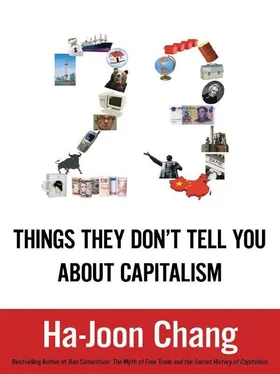Ha-Joon Chang - 23 Things They Don't Tell You about Capitalism
Здесь есть возможность читать онлайн «Ha-Joon Chang - 23 Things They Don't Tell You about Capitalism» весь текст электронной книги совершенно бесплатно (целиком полную версию без сокращений). В некоторых случаях можно слушать аудио, скачать через торрент в формате fb2 и присутствует краткое содержание. Город: NY, Год выпуска: 2011, ISBN: 2011, Издательство: Bloomsbury Publishing Plc, Жанр: Публицистика, economics, на английском языке. Описание произведения, (предисловие) а так же отзывы посетителей доступны на портале библиотеки ЛибКат.
- Название:23 Things They Don't Tell You about Capitalism
- Автор:
- Издательство:Bloomsbury Publishing Plc
- Жанр:
- Год:2011
- Город:NY
- ISBN:978-1-60819-358-5
- Рейтинг книги:5 / 5. Голосов: 1
-
Избранное:Добавить в избранное
- Отзывы:
-
Ваша оценка:
23 Things They Don't Tell You about Capitalism: краткое содержание, описание и аннотация
Предлагаем к чтению аннотацию, описание, краткое содержание или предисловие (зависит от того, что написал сам автор книги «23 Things They Don't Tell You about Capitalism»). Если вы не нашли необходимую информацию о книге — напишите в комментариях, мы постараемся отыскать её.
The acclaimed Ha-Joon Chang is a voice of sanity-and wit-in this lighthearted book with a serious purpose: to question the assumptions behind the dogma and sheer hype that the dominant school of neoliberal economists have spun since the Age of Reagan.
uses twenty-three short essays (a few great examples:
) to equip readers with an understanding of how global capitalism works, and doesn't, while offering a vision of how we can shape capitalism to humane ends, instead of becoming slaves of the market.
Praise for
:
"A lively, accessible and provocative book."-
(UK )
"Chang, befitting his position as an economics professor at Cambridge University, is engagingly thoughtful and opinionated at a much lower decibel level. 'The "truths" peddled by free-market ideologues are based on lazy assumptions and blinkered visions,' he charges."-






![Ally Carter - [Gallagher Girls 01] I'd Tell You I Love You But Then I'd Have to Kill You](/books/262179/ally-carter-gallagher-girls-01-i-d-tell-you-i-lo-thumb.webp)





